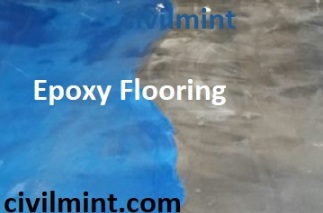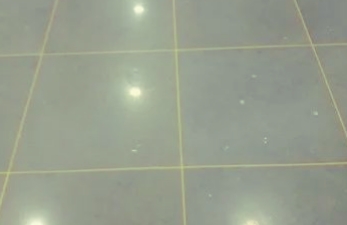Table of Contents
What Is Epoxy Flooring?
A flooring surface that consists of multiple layers of epoxy that is applied to a floor with a depth of at least 2 mm is known as Epoxy Flooring. An epoxy floor having less than 2 mm depth is known as Epoxy Coating.

What Is Epoxy?
Epoxy is a thermosetting polymer that has unique mechanical and resistivity properties.
Epoxy combined with resins and hardeners creates chemical bonds that produce stiff plastic material that is durable, resistant to degradation, and bonds exceptionally well to its substrate.
What Is Epoxy Floor Tiles?
Epoxy flooring tiles are strong and tough tiles made for big buildings and factories. They are put on the floor after adding layers of a special material called epoxy resin.

The tiles look nice because they have colorful flakes or chips. Once they are on the floor, they become a smooth and shiny surface that can’t be easily stained or damaged.
People like using these tiles because they last a long time, don’t need much cleaning, and can handle lots of people walking on them. You can find them in places like big garages, big storage buildings, and even hospitals where many people go.
Purpose Of Epoxy Coating
Epoxy coatings serve the purpose of offering protection and durability to surfaces. They are commonly applied on floors, countertops, and other surfaces to enhance their appearance and safeguard them.
These coatings exhibit outstanding resistance against chemicals, abrasion, impact, and moisture. Moreover, epoxy coatings provide a smooth, glossy finish that is effortless to clean and maintain.
They are versatile and can be used to seal and protect various materials such as concrete, metal, and wood, thereby extending their lifespan and enhancing their performance.
Types Of Epoxy Floor
- Self Leveling Epoxy Flooring
- Quartz Epoxy Flooring
- Epoxy Mortar Flooring
- Anti-Static Epoxy Flooring
- Flake Epoxy Flooring
We will know these 5 types of epoxy flooring.
1. Self Leveling Epoxy Flooring
Self Leveling epoxy is suitable for new concrete surfaces and old concrete surfaces. Self-leveling concrete provides a smooth and shiny surface. It comes in different colors.
2. Quartz Epoxy Flooring
Quartz-filled Epoxy Flooring is a mixture of high-performance epoxy polymer with stained quartz grains. Quartz Epoxy Flooring is suitable for decorative space.
3. Epoxy Mortar Flooring
Epoxy Mortar Flooring is one of the strongest epoxy floorings. This type of epoxy flooring is normally used in heavy industry. It is also used to repair cracks.
4. Anti-Static Epoxy Flooring
This type of Epoxy Flooring prevents Electro-static charge. It is appropriate where static-sensitive electronic components are placed. It is provided in hospitals, laboratories, etc.
5. Flake Epoxy Flooring
This is not typical Epoxy Flooring. It is used to decorate the epoxy coated floor by inserting into the epoxy coated surface. It provides grooves in the epoxy-coated surface to resist slips.
What Is 3D Epoxy Flooring?
3D epoxy flooring has gained significant popularity in recent times and can be commonly found in various settings, including offices, shopping malls, and homes.

The installation process typically begins by applying a layer of self-leveling primer on the floor surface. Once the primer is in place, the desired 3D image or design is carefully placed on top. This image is often printed on a specialized film or sticker specifically designed for 3D flooring.
Multiple layers of clear epoxy resin are then applied over the image to create a smooth and glossy finish. This process helps to create the illusion of depth and dimension, giving the impression that the floor is three-dimensional. The final result is a visually captivating and unique flooring option that can transform the look and feel of a space.
Advantages of Epoxy Flooring:
- Epoxy floors are very strong and can handle lots of people walking on them without getting damaged.
- It’s easy to keep epoxy floors clean because spills don’t soak in and leave stains.
- Epoxy floors can be made in different colors and patterns, so you can choose the one you like best.
- Epoxy floors can handle heavy machines without breaking, so they are great for factories and big buildings.
- If you take care of epoxy floors, they can stay looking nice for a really long time.
- Epoxy floors are not a good place for germs to grow, so they’re good for places like hospitals and food places.
- Epoxy floors can have a rough surface that makes them not slippery, so people won’t fall easily.
- Epoxy floors can handle things falling on them without getting damaged, which is important in busy places.
- Epoxy floors can be installed quickly, so you don’t have to wait for a long time to use the floor.
- Epoxy floors can protect the floor underneath from chemicals and other things that can damage it.
Disadvantages of Epoxy Flooring:
- Epoxy floors can be more expensive to put in compared to other types of floors.
- You need to hire experts to install epoxy floors because it’s not something you can do by yourself.
- When installing epoxy floors, you need to work fast because the material dries quickly.
- Epoxy floors can turn yellow or change color when exposed to sunlight for a long time.
- Even though epoxy floors can be made less slippery, they can still be slippery when they get wet, so you need to be careful.
